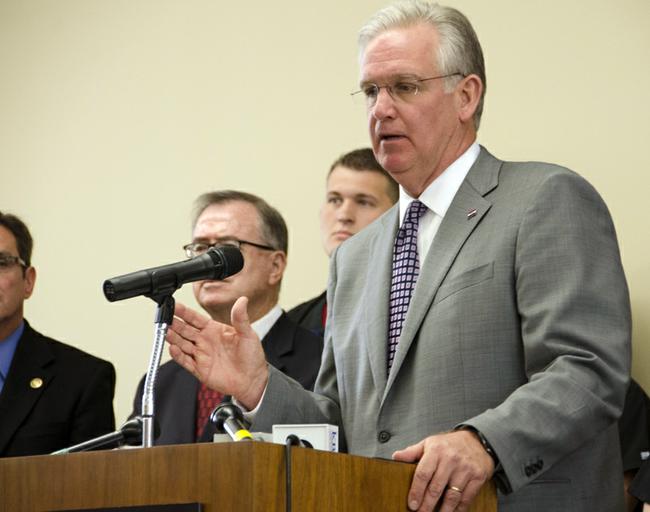Gov. Jay Nixon delivered a speech at the School of Nursing on Thursday. Students, faculty and local reporters gathered in anticipation and celebration of the governor’s arrival and announcement of an increase in funding to the nursing program.
MU will receive $150,000 of the $1 million allotted to Missouri public universities’ nursing programs.
Two of the students in attendance were Miles Shannon and Todd Morris, both seniors in the nursing program. Shannon and Morris were in agreement on where they would like to see changes in the funding: more scholarships to encourage students interested in the healthcare profession.
“There are a lot of fields of nursing,” Shannon said. “I would really like to see more speakers and exposure to those options.”
Nixon said this money will also go toward clinical simulations for patients that require more specific needs, such as children and the elderly. This will benefit students like Shannon and Morris who plan on going into the field of pediatrics, Morris said.
This money will also go to the Nurse Education Incentive Fund to help prepare those who are interested in teaching about the nursing profession.
Nixon began by addressing the importance of healthcare for all citizens, and with new legislation, the growing needs of healthcare professionals. One piece of new and vital legislation is the Caring for Missourians Initiative.
“This bill is good medicine for the healthcare system in Missouri and the wellness of Missourians,” Nixon said.
In the Caring for Missourians Initiative’s first year, MU alone was given more than $9 million of the $40 million allotted statewide to public universities to increase the capacity of their healthcare training programs.
Nixon also said that a profession in healthcare is a recession-proof one.
“Even in a down economy, there is an estimated shortage of 1 million nurses nationwide by 2020,” he said.
Nixon then turned the microphone over to Judith Fitzgerald Miller, Dean of the Nursing School. Miller said this increase in funding would allow the nursing school, specifically, to employ more faculty, modernize learning environments, increase access to simulations and distance learning programs.
“Investing in nursing programs means a healthy state with healthy citizens,” she said. “Healthy citizens hold productive roles, work roles and honorable citizens who give back to support the state.”








